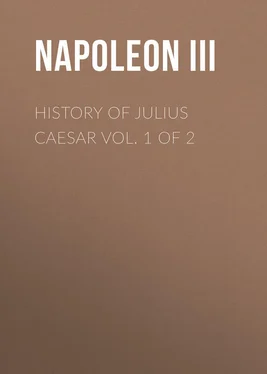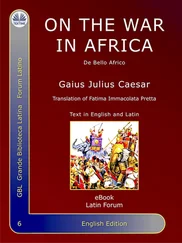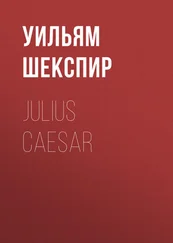Napoleon III - History of Julius Caesar Vol. 1 of 2
Здесь есть возможность читать онлайн «Napoleon III - History of Julius Caesar Vol. 1 of 2» — ознакомительный отрывок электронной книги совершенно бесплатно, а после прочтения отрывка купить полную версию. В некоторых случаях можно слушать аудио, скачать через торрент в формате fb2 и присутствует краткое содержание. Жанр: foreign_antique, foreign_prose, Биографии и Мемуары, на английском языке. Описание произведения, (предисловие) а так же отзывы посетителей доступны на портале библиотеки ЛибКат.
- Название:History of Julius Caesar Vol. 1 of 2
- Автор:
- Жанр:
- Год:неизвестен
- ISBN:нет данных
- Рейтинг книги:5 / 5. Голосов: 1
-
Избранное:Добавить в избранное
- Отзывы:
-
Ваша оценка:
- 100
- 1
- 2
- 3
- 4
- 5
History of Julius Caesar Vol. 1 of 2: краткое содержание, описание и аннотация
Предлагаем к чтению аннотацию, описание, краткое содержание или предисловие (зависит от того, что написал сам автор книги «History of Julius Caesar Vol. 1 of 2»). Если вы не нашли необходимую информацию о книге — напишите в комментариях, мы постараемся отыскать её.
History of Julius Caesar Vol. 1 of 2 — читать онлайн ознакомительный отрывок
Ниже представлен текст книги, разбитый по страницам. Система сохранения места последней прочитанной страницы, позволяет с удобством читать онлайн бесплатно книгу «History of Julius Caesar Vol. 1 of 2», без необходимости каждый раз заново искать на чём Вы остановились. Поставьте закладку, и сможете в любой момент перейти на страницу, на которой закончили чтение.
Интервал:
Закладка:
But if the pretended fear of the return of the ancient régime was a powerful means of government in the hands of the patricians, the real fear of seeing their privileges attacked by the plebeians restrained them within the bounds of moderation and justice.
In fact, if the numerous class, excluded from all office, had not interfered by their clamours to set limits to the privileges of the nobility, and thus compelled it to render itself worthy of power by its virtues, and re-invigorated it, in some sort, by the infusion of new blood, corruption and arbitrary spirit would, some ages earlier, have dragged it to its ruin. A caste which is not renewed by foreign elements is condemned to disappear; and absolute power, whether it belongs to one man or to a class of individuals, finishes always by being equally dangerous to him who exercises it. This concurrence of the plebeians excited in the Republic a fortunate emulation which produced great men, for, as Machiavelli says: 92 92 Discourse on Titus Livius , I. 5.
“The fear of losing gives birth in men’s hearts to the same passions as the desire of acquiring.” Although the aristocracy had long defended with obstinacy its privileges, it made opportunely useful concessions. Skilful in repairing incessantly its defeats, it took again, under another form, what it had been constrained to abandon, losing often some of its attributes, but preserving its prestige always untouched.
Thus, the characteristic fact of the Roman institutions was to form men apt for all functions. As long as on a narrow theatre the ruling class had the wisdom to limit its ambition to promoting the veritable interests of their country, as the seduction of riches and unbounded power did not come to exalt it beyond measure, the aristocratic system maintained itself with all its advantages, and overruled the instability of institutions. It alone, indeed, was capable of supporting long, without succumbing, a régime in which the direction of the State and the command of the armies passed annually into different hands, and depended upon elections the element of which is ever fickle. Besides, the laws gave rise to antagonisms more calculated to cause anarchy than to consolidate true liberty. Let us examine, in these last relations, the constitution of the Republic.
Institutions of the Republic.
II. The two consuls were originally generals, judges, and administrators; equal in powers, they were often in disagreement, either in the Forum, 93 93 Proofs of the disagreement of the two consuls: “Cassius brought secretly as many Latins and Hernici as he possibly could to have their suffrages; there arrived in Rome such a great number, that in a short time the town was full of strangers. Virginius, who was informed of it, caused a herald to proclaim in all the public places that all those who had no domicile in Rome should withdraw immediately; but Cassius gave orders contrary to those of his colleague, forbidding any one who had the right of Roman freedom to quit the town until the law was confirmed and received.” (Year of Rome 268.) (Dionysius of Halicarnassus, VIII. 72.) – “Quinctius, more indulgent than his colleague, willed the concession to the people of all their just and reasonable demands; Appius, on the contrary, was willing to die rather than to yield.” (Year of Rome 283.) (Dionysius of Halicarnassus, IX. 48.)
or on the field of battle. 94 94 “The two consuls were of the most opposite tempers, and were always in discord ( dissimiles discordesque ).” (Titus Livius, XXII. 41.) – “While they lost their time in quarrels rather than in deliberations.” (Titus Livius, XXII. 45.)
Their dissensions were repeated many times until the consulate of Cæsar and Bibulus; and they were liable to become the more dangerous as the decision of one consul was annulled by the opposition of his colleague. On the other hand, the short duration of their magistracy constrained them either to hurry a battle in order to rob their successor of the glory, 95 95 Titus Livius, XXI. 52. – Dio Cassius, Fragments , CCLXXI. edit. Gros.
or to interrupt a campaign in order to proceed to Rome to hold the comitia. The defeats of the Trebia and Cannæ, with that of Servilius Cæpio by the Cimbri, 96 96 Titus Livius, XXI. 52.
were fatal examples of the want of unity in the direction of war.
In order to lessen the evil effects of a simultaneous exercise of their prerogatives, the consuls agreed to take in campaign the command alternately day by day, and at Rome each to have the fasces during a month; but this innovation had also vexatious consequences. 97 97 “In the Roman army the two consuls enjoyed an equal power; but the deference of Agrippa in concentrating the authority in the hands of his colleague, established the unity so necessary for the success of great enterprises.” (Titus Livius, III. 70.) – “The two consuls commanded often both in the day of battle.” (Titus Livius, Battle of Mount Vesuvius , VIII. 9; Battle of Sentinum , X. 27.) – “A fatal innovation; from that time each had in view his personal interest, and not the general interest, preferring to see the Republic experience a check than his colleague covered with glory, and evils without number afflicted the fatherland.” (Dio Cassius, Fragments , LI. edit. Gros.)
It was even thought necessary, nine years after the fall of the kings, to have recourse to the dictatorship; and this absolute authority, limited to six months, that is, to the longest duration of a campaign, only remedied temporarily, and under extraordinary circumstances, the want of power concentrated in a single individual.
This dualism and instability of the supreme authority were not, therefore, an element of strength; the unity and fixity of direction necessary among a people always at war had disappeared; but the evil would have been more serious if the conformity of interests and views of individuals belonging to the same caste had not been there to lessen it. The man was worth more than the institutions which had formed him.
The creation of tribunes of the people, whose part became subsequently so important, was, in 260, a new cause of discord; the plebeians, who composed the greater part of the army, claimed to have their military chiefs for magistrates; 98 98 “They called tribunes of the people those who, from tribunes of the soldiers, which they were first, were charged with the defence of the people during its retreat at Crustumerium.” (Varro, De Lingua Latina , V. 81, edition of O. Müller.)
the authority of the tribunes was at first limited: we may convince ourselves of this by the following terms of the law which established the office: 99 99 “The discontented obtained from the patricians the confirmation of their magistrates; afterwards they demanded of the Senate the permission to elect annually two plebeians ( ediles ) to second the tribunes in all things in which they might have need of aid, to judge the causes which these might entrust into their hands, to have care of the sacred and public edifices, and to ensure the supplying of the market with provisions.” (Year of Rome 260.) (Dionysius of Halicarnassus, VI. 90.)
—
“Nobody shall constrain a tribune of the people, like a man of the commonalty, to do anything against his will; it shall not be permitted either to strike him, or to cause him to be maltreated by another, or to slay him or cause him to be slain.” 100 100 Dionysius of Halicarnassus, VI. 89.
We may judge by this the degree of inferiority to which the plebeians were reduced. The veto of the tribunes could nevertheless put a stop to the proposal of a law, prevent the decisions of the consuls and Senate, arrest the levies of troops, prorogue the convocation of the comitia, and hinder the election of magistrates. 101 101 The tribunes oppose the enrolment of troops. (Year of Rome 269.) (Dionysius of Halicarnassus, VIII. 81.) – “Licinius and Sextius re-elected tribunes of the people, allowed no curule magistrate to be elected; and, as the people continued to re-appoint the two tribunes, who always threw out the elections of the military tribunes, the town remained five years deprived of magistrates.” (Year of Rome 378.) (Titus Livius, VI. 35.) – “Each time the consuls convoked the people to confer the consulship on the candidates, the tribunes, in virtue of their powers, prevented the holding of the assemblies. So also, when these assembled the people to make the election, the consuls opposed it, pretending that the right of convoking the people and collecting the suffrages belonged to them alone.” (Year of Rome 271.) (Dionysius of Halicarnassus, VIII. 90.) – “Sometimes the tribunes prevented the patricians from assembling for the election of the interrex, sometimes they forbade the interrex himself making the senatus consultus for the consular comitia.” (Year of Rome 333.) (Titus Livius, IV. 43.)
From the year 297, their number was raised to ten, that is, two for each of the five classes specially subject to the recruitment; 102 102 Titus Livius, III. 30.
but the plebeians profited little by this measure; the more the number of tribunes was augmented, the easier it became for the aristocracy to find among them an instrument for its designs. Gradually their influence increased; in 298, they laid claim to the right of convoking the Senate, and yet it was still a long time before they formed part of that body. 103 103 Dionysius of Halicarnassus, X. 31.
Интервал:
Закладка:
Похожие книги на «History of Julius Caesar Vol. 1 of 2»
Представляем Вашему вниманию похожие книги на «History of Julius Caesar Vol. 1 of 2» списком для выбора. Мы отобрали схожую по названию и смыслу литературу в надежде предоставить читателям больше вариантов отыскать новые, интересные, ещё непрочитанные произведения.
Обсуждение, отзывы о книге «History of Julius Caesar Vol. 1 of 2» и просто собственные мнения читателей. Оставьте ваши комментарии, напишите, что Вы думаете о произведении, его смысле или главных героях. Укажите что конкретно понравилось, а что нет, и почему Вы так считаете.












